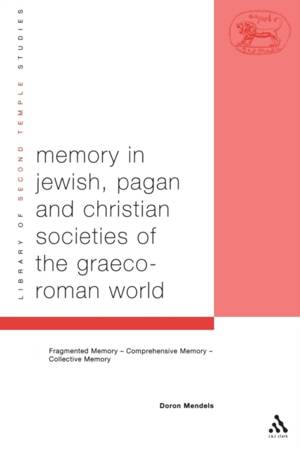
Bedankt voor het vertrouwen het afgelopen jaar! Om jou te bedanken bieden we GRATIS verzending (in België) aan op alles gedurende de hele maand januari.
- Afhalen na 1 uur in een winkel met voorraad
- In januari gratis thuislevering in België
- Ruim aanbod met 7 miljoen producten
Bedankt voor het vertrouwen het afgelopen jaar! Om jou te bedanken bieden we GRATIS verzending (in België) aan op alles gedurende de hele maand januari.
- Afhalen na 1 uur in een winkel met voorraad
- In januari gratis thuislevering in België
- Ruim aanbod met 7 miljoen producten
Zoeken
Memory in Jewish, Pagan and Christian Societies of the Graeco-Roman World
Doron Mendels
€ 296,95
+ 593 punten
Omschrijving
The ten studies in this book explore the phenomenon of public memory in societies of the Graeco-Roman period. Mendels begins with a concise discussion of the historical canon that emerged in Late Antiquity and brought with it the (distorted) memory of ancient history in Western culture. The following nine chapters each focus on a different source of collective memory in order to demonstrate the patchy and incomplete associations ancient societies had with their past, including discussions of Plato's Politeia, a "site of memory" of the early church, and the dichotomy existing between the reality of the land of Israel in the Second Temple period and memories of it.
Throughout the book, Mendels shows that since the societies of Antiquity had associations with only bits and pieces of their past, these associations could be slippery and problematic, constantly changing, multiplying and submerging. Memories, true and false, oral and inscribed, provide good evidence for this fluidity.
Throughout the book, Mendels shows that since the societies of Antiquity had associations with only bits and pieces of their past, these associations could be slippery and problematic, constantly changing, multiplying and submerging. Memories, true and false, oral and inscribed, provide good evidence for this fluidity.
Specificaties
Betrokkenen
- Auteur(s):
- Uitgeverij:
Inhoud
- Aantal bladzijden:
- 184
- Taal:
- Engels
- Reeks:
- Reeksnummer:
- nr. 48
Eigenschappen
- Productcode (EAN):
- 9780567080547
- Verschijningsdatum:
- 29/07/2004
- Uitvoering:
- Paperback
- Formaat:
- Trade paperback (VS)
- Afmetingen:
- 157 mm x 232 mm
- Gewicht:
- 285 g

Alleen bij Standaard Boekhandel
+ 593 punten op je klantenkaart van Standaard Boekhandel
Beoordelingen
We publiceren alleen reviews die voldoen aan de voorwaarden voor reviews. Bekijk onze voorwaarden voor reviews.









